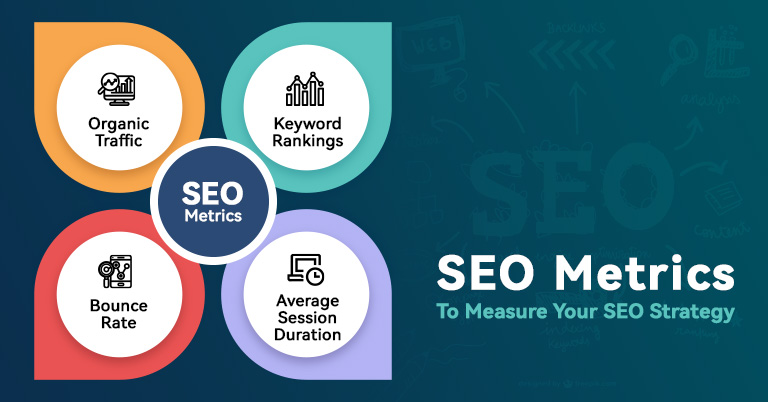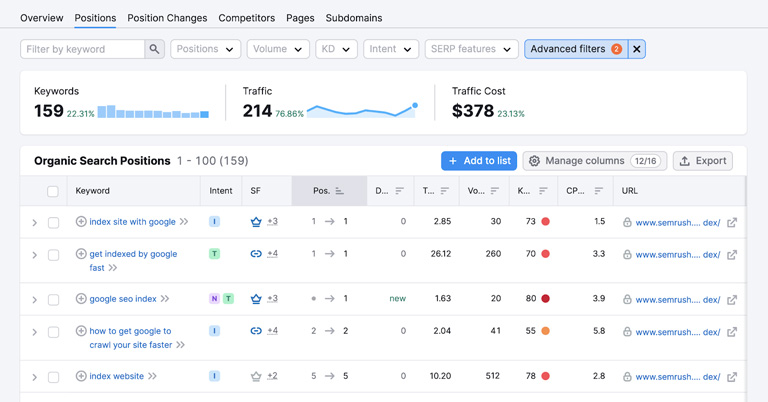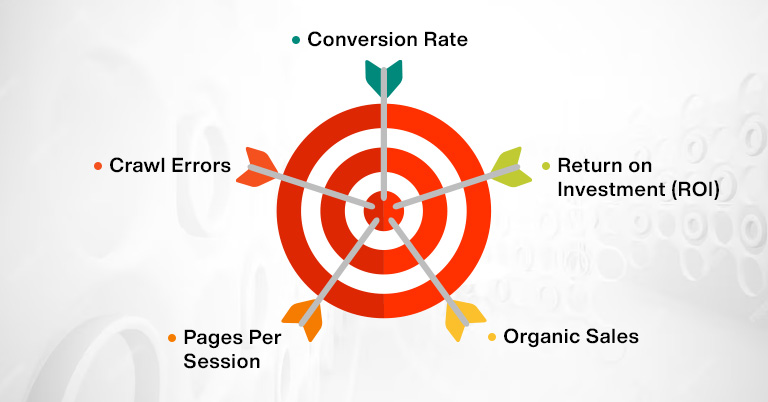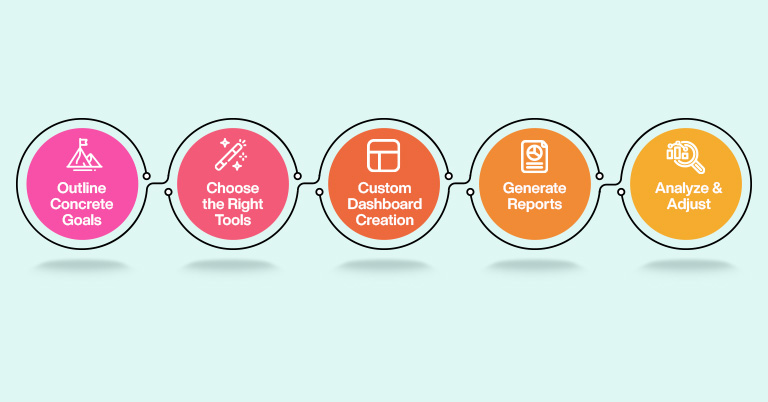
Have you ever wondered why businesses are increasingly turning to digital marketing? Beyond its accessibility, flexibility, and cost-effectiveness, digital marketing’s most significant advantage is the ability to measure results accurately—something traditional marketing can’t offer.
While traditional marketing, such as print ads and billboards, can reach large audiences, it lacks precise targeting and tracking capabilities. There’s no way to know who read your newspaper ad or bought a product after seeing your billboard. Digital marketing, on the other hand, provides numerous tools to test, monitor, and optimize campaigns. The ability to set clear KPI goals and track their performance has revolutionized the field, making it possible for companies to grow their customer base and sales online effectively.
Our eCommerce SEO experts have conducted extensive experiments to identify the most critical eCommerce metrics and KPIs you need to track for successful campaigns. We are excited to share these insights to help you achieve better results.
UNDERSTANDING SEO METRICS AND KPIS
Before we dive into the specifics, let’s clarify the difference between metrics and KPIs. Metrics are quantifiable measures that provide data about your website’s performance, such as traffic, engagement, and technical factors. KPIs, on the other hand, are specific metrics that directly align with your business objectives and goals, such as revenue, conversion rates, or return on investment (ROI).
Think of metrics as the raw data points and KPIs as the essential nuggets of information that directly impact your bottom line. Both are crucial for measuring eCommerce SEO success, but KPIs are the ones that truly matter when it comes to driving business growth.
KEY ECOMMERCE METRICS TO MEASURE SEO SUCCESS
To gauge the effectiveness of your SEO efforts, it’s imperative to track the right eCommerce performance metrics that significantly influence your revenue. Here are some top-rated ones.

- Organic Traffic
It represents potential customers actively searching for products or services like yours, making it a highly valuable source of targeted traffic. Unlike paid advertising, which can quickly become costly, organic traffic is essentially free – the result of effective SEO strategies that position your website favorably in search engine results.
If you notice a steady increase in organic traffic, it could signal that your keyword targeting, on-page optimization, and content strategies are resonating with your target audience. Conversely, a decline may indicate the need to reevaluate and refine your SEO approach.
- Keyword Rankings
Monitoring your website’s ranking positions for relevant keywords can provide insights into your visibility in SERPs. This directly impacts the discoverability of your products or services in organic search.
It’s also important to note that keyword rankings can vary based on factors like the user’s location, search history, or device type. Therefore, you should consider tracking rankings from multiple locations, devices, and even different search engines (if relevant) to get a more comprehensive understanding of your visibility.

- Bounce Rate
Yet another important eCommerce SEO performance metric, bounce rate helps measure the percentage of visitors who leave your website after viewing only one page. A high bounce rate could signal issues with content quality, user experience, or relevance to the search query – it’s a red flag that something needs to be addressed. For instance, if your product pages consistently show a high bounce rate, it may suggest that the content on those pages does not adequately address the needs or expectations of your visitors.
It’s important to note that bounce rates should be analyzed in context. It’s reasonable for certain pages, like contact or FAQ pages, to have higher bounce rates because visitors may quickly find the specific information they need before leaving. However, for most of your website’s pages, a high bounce rate should be seen as an opportunity for improvement.
- Average Session Duration
When it comes to measuring the success of your SEO campaign, tracking the average session duration can provide valuable insights into the effectiveness of your content and website user experience. If your strategies are attracting the right audience and providing them with valuable information, you should see an increase in the average session duration.
CRITICAL ECOMMERCE SEO KPIS TO TRACK
By tracking a set of carefully curated eCommerce KPIs, you can get valuable insights into customer behavior, marketing effectiveness, and operational efficiency, positioning your online store for long-term success in the ever-evolving digital marketplace.

- Conversion Rate
It measures the percentage of visitors who arrive via organic search and complete desired actions, such as making a purchase, signing up for a newsletter, or adding items to their cart.
Importance: Gauges the effectiveness of your SEO efforts, website design, user experience, and content in converting organic traffic into customers.
Example: If 1,000 visitors come from organic search and 50 make a purchase, your conversion rate is 5%. By optimizing your SEO strategies and improving on-page elements like call-to-action buttons or simplifying the checkout process, you can potentially increase this rate, leading to more sales.
- Return on Investment (ROI)
Compares the revenue generated from your SEO efforts to the associated costs, helping you assess the effectiveness and profitability of your SEO strategy.
Importance: Allows you to make data-driven decisions about continuing, adjusting, or scaling your SEO initiatives.
Example: If you invest $1,000 in SEO and generate $3,000 in sales from organic traffic, your ROI is 200%. This indicates a successful SEO strategy and justifies further investment in SEO to continue driving profitable organic traffic.
- Organic Sales
The total revenue generated from visitors who arrive at your site via organic search.
Importance: This KPI directly links your SEO efforts to business revenue, providing a clear measurement of the financial impact of your organic traffic. Monitoring organic sales helps you understand how effectively your SEO strategy is converting organic visitors into paying customers. It also allows you to justify SEO investments by showing their contribution to the bottom line.
Example: If your monthly organic sales total $10,000, this will demonstrate the revenue attributable to your SEO strategy. For instance, if you implement an SEO campaign targeting long-tail keywords and notice an increase in organic sales from $8,000 to $10,000, you can correlate the growth to your improved search visibility and targeted traffic.
- Pages Per Session
The average number of pages viewed during a session by visitors who visit your site through organic search.
Importance: A higher number of pages per session indicates greater user engagement and effective site navigation, suggesting that visitors find your content compelling and are exploring more of your site. This KPI helps you evaluate the quality of your website’s content and structure. It also provides insights into user behavior, indicating whether visitors are finding relevant information easily or if they are bouncing off after viewing a single page.
- Crawl Errors
This refers to the issues search engine crawlers encounter when attempting to access and index your eCommerce site’s pages.
Importance: These errors highlight technical obstacles preventing search engines from properly indexing your content, potentially impacting your site’s visibility and rankings in search results.
Example: Common crawl errors include 404 errors (page not found), 500 errors (server issues), and 301/302 errors (redirect issues). Promptly resolving these errors by fixing broken links, addressing server problems, and optimizing redirects ensure all pages are accessible and indexed correctly, thereby maintaining or improving your site’s search engine rankings and visibility.
HOW SHOULD YOU TRACK ECOMMERCE SEO METRICS AND KPIS?
Effectively tracking your eCommerce KPIs and metrics involves using the right tools and adopting best practices. Here are some steps:

Outline Concrete Goals
Establish SMART (specific, measurable, achievable, relevant, time-bound) objectives for your SEO efforts.
Choose the Right Tools
Use a combination of analytics and SEO tools to track your metrics, such as Google Analytics, SEMrush, or Ahrefs.
Create Custom Dashboards
Set up custom dashboards to visualize key metrics, track your progress, and identify trends without having to dig through extensive reports.
Generate Reports
Create regular reports (weekly, monthly, quarterly) to review your performance against your goals.
Analyze and Adjust
Use the data from your reports to identify strengths and weaknesses in your SEO strategy.
HOW OFTEN SHOULD YOU CHECK SEO PERFORMANCE METRICS?
Regularly monitoring your eCommerce metrics and KPIs is crucial to staying on top of your SEO efforts and making timely adjustments. Here’s a guideline for how often you should check different metrics.
- Daily keep a tab on critical metrics like organic traffic, conversion rate, and sales performance. This enables you to quickly identify any sudden changes or issues that may require immediate attention.
- Weekly review keyword rankings, bounce rate, and click-through rate (CTR). This allows you to track progress and make tactical adjustments to your SEO strategies without being overwhelmed by daily fluctuations.
- Monthly analyze more in-depth metrics such as domain authority (DA), page authority (PA), CLV, or AOV. This provides a broader perspective on your SEO performance and helps you identify long-term trends and patterns.
- Quarterly conduct comprehensive SEO audits and assess your backlink profile. This ensures your site remains optimized for search engines and builds a strong backlink profile over time.
HOW TO TRACK METRICS WITH LIMITED RESOURCES?
Many businesses, especially startups, face resource constraints that can make it challenging to implement comprehensive tracking and monitoring systems. However, there are still ways to track critical eCommerce KPIs, including:
- Leveraging free and low-cost tools for basic tracking
- Focusing on the most critical metrics aligned with your business goals
- Implementing basic tracking mechanisms like conversion goal tracking
- Automating data collection and reporting processes where possible
While these strategies can help you track metrics with limited resources, they may not provide the comprehensive insights required for long-term success. This is where leveraging eCommerce SEO marketing services from third-party providers can be beneficial.
- Expertise and Knowledge: Experts in eCommerce analytics and data tracking have a deep understanding of the latest tools, techniques, and best practices. They can help you identify the most relevant KPIs and implement robust tracking systems tailored to your needs.
- Time and Resource Efficiency: By outsourcing your tracking and analysis needs, you can free up valuable time and resources within your organization, allowing you to focus on other critical aspects of your business.
- Advanced Insights and Optimization: eCommerce SEO experts leverage their experience and industry knowledge to provide advanced insights into your site performance. They can help you identify opportunities for optimization, fine-tune your strategies, and make data-driven decisions.
- Scalability and Future-Proofing: As your business grows, your tracking needs will become more complex. Partnering with an eCommerce SEO Services company can ensure your systems are scalable and future-proof, enabling you to adapt to changing market conditions and evolving customer demands.
START WITH A FREE SEO AUDIT
Before diving into tracking and optimizing metrics, it’s crucial to assess your eCommerce store’s SEO foundation. This initial review ensures you’re taking the right steps, at the right time, in the right direction for long-term success. Fortunately, you don’t have to navigate this process alone. Our trusted eCommerce SEO experts offer complimentary consultations to help you get started on the right path.
Take the first step toward eCommerce excellence – schedule your free consultation now!